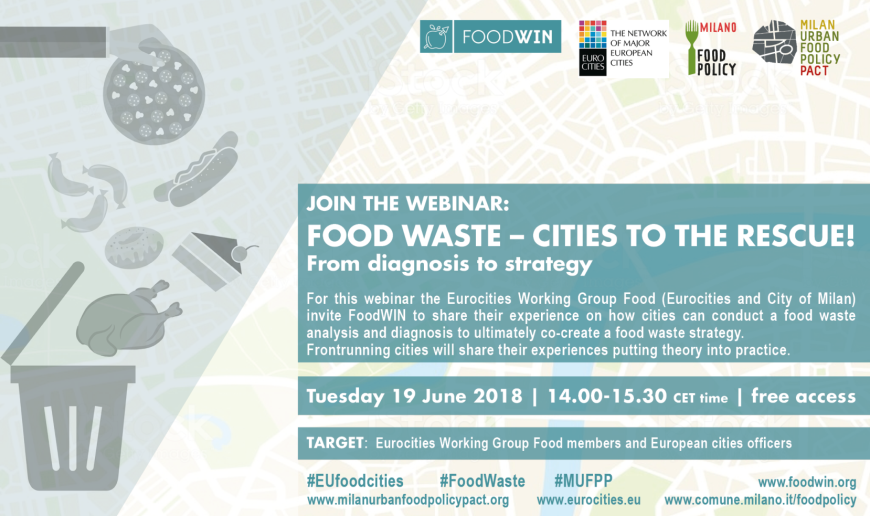
The webinar “Food Waste: cities to the rescue! From diagnosis to strategy” took place last 19 June and focused on the development of a strategy to tackle the problem of food waste in European cities.
It rose from a successful collaboration between FoodWIN, the European Food Waste Innovation Network supporting European cities to reduce food waste, EUROCITIES, the network of major European cities and the Milan Urban Food Policy Pact, signed in Milan in October 2015 during Expo by more than 100 cities.
The moderators were Joris Depouillon, co-founder of FoodWIN and Anja Katalin de Cunto, funding and financing coordinator at EUROCITIES. After having explained the idea behind the project, he pointed out that food waste is highly widespread not only in the private sector, but also in public organizations; however, according to recent studies from the United States, food waste occurs more at households level than canteens or supermarkets.
Cities must reduce food waste and city municipalities are intended to be the best catalysts to address this problem by involving the largest possible number of stakeholders.
Furthermore by tackling food waste, cities could drastically reduce public administration costs, while reducing food waste might be the most cost-efficient way to reduce the overall greenhouse gas emissions. And finally, using high-quality food surplus can support citizens in need.
Depouillon also explained the practical steps that cities need to undertake in order to outline a successful food waste strategy at local level, from the diagnosis to the implementation phase. In particular, to set up a good food strategy it is key to focus on 1 to maximum 2 sectors at a time, because experience shows that it is not possible to enact a good strategy covering all possible areas at once. It could also be good to create a food strategy starting from other cities successful models.
The goal must be concrete: Depouillon said in particular that a city “doesn’t have to reinvent the wheel”, but it has to learn from other cities experiences about food waste. With the support of the stakeholders, it is possible to identify concrete measures to raise awareness and evaluate the actions taken, in order to verify whether there may be the need to intervene with a revised strategy. It takes between 3 and 6 months to go from a diagnosis until a concrete food strategy in an average European city.
The webinar had also been an opportunity for the cities of Bruges and Milan, to share their experiences and lesson learnt.
Karine de Batselier, climate coordinator of the Bruges municipality explained the case of the Belgian city as one of the first cities in Europe that deployed a food waste diagnosis to perform a good strategy. In 2015, the city of Bruges facilitated a process to build a sustainable food policy focused on food waste reduction in public organizations. Starting from a recent research that shows that food waste is a big problem in the healthcare sector and could reach up to 40% of the total waste at municipality level, the Municipality coordinated an inclusive participatory process of measurement, ideation, evaluation and refinement of food waste reduction approaches in the healthcare sector.
Karine de Batselier, climate coordinator of the Bruges municipality explained the case of the Belgian city as one of the first cities in Europe that deployed a food waste diagnosis to perform a good strategy. In 2015, the city of Bruges facilitated a process to build a sustainable food policy focused on food waste reduction in public organizations. Starting from a recent research that shows that food waste is a big problem in the healthcare sector and could reach up to 40% of the total waste at municipality level, the Municipality coordinated an inclusive participatory process of measurement, ideation, evaluation and refinement of food waste reduction approaches in the healthcare sector.
The first step of the process was the measure and analysis of the current food waste and its economic impact in 4 selected health care institutions of Bruges. Then the personnel of the healthcare structures was trained in measuring food waste and was actively involved in an innovative process to find specific solutions, that were transferred to other healthcare institutions in Bruges and the region of Flanders through a manual.
Andrea Magarini, coordinator of the Milan Food Policy and chair of Eurocities food working group, talked about the making of the inter-city pact of 2015. This contains a multidimensional approach around five key priorities; among them, food losses and waste reduction are the most important, engaging several local actors such as: research centers, private sector, non profit organizations, foundations.
Another important measure adopted this year by the Milan Municipality is a tax reduction on food losses for donation: it aims to reduce 20% of the tax for the first year in favor of food businesses (supermarkets, restaurants, canteens, producers etc.) that donate their food losses to charities.
At the end of the webinar, before the Q&A session, Marcelline Bonneau, Director at Resilia Solutions, briefly talked about “Maîtres frigo”, a project that has been possible, thanks to a funding from the Brussels environment Ministry, in which Refresh, a small restaurant in Brussels proposing dishes cooked out of unsold products, organized a training to become “ambassadors” of anti-food waste practices throughout the city.
At the end of the webinar, before the Q&A session, Marcelline Bonneau, Director at Resilia Solutions, briefly talked about “Maîtres frigo”, a project that has been possible, thanks to a funding from the Brussels environment Ministry, in which Refresh, a small restaurant in Brussels proposing dishes cooked out of unsold products, organized a training to become “ambassadors” of anti-food waste practices throughout the city.
Lorenzo Russo
Winner of the Master’s Degree Prize “Europe that will be” given by the Emilia-Romagna Regional Council
Europe Direct Emilia Romagna
Winner of the Master’s Degree Prize “Europe that will be” given by the Emilia-Romagna Regional Council
Europe Direct Emilia Romagna
